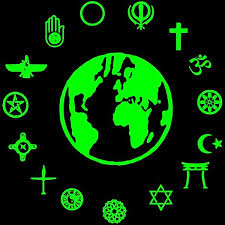Religion in West Phoenicia
This article is incomplete because it is pending further input from participants, or it is a work-in-progress by one author. Please comment on this article's talk page to share your input, comments and questions. Note: To contribute to this article, you may need to seek help from the author(s) of this page. |
| Agency overview | |
|---|---|
| Formed | 1950 |
| Jurisdiction | Confederate Empire of West Phoenicia |
| Headquarters | Agape, West Phoenicia |
| Employees | 120,000 |
| Annual budget | Not disclosed |
| Minister responsible |
|
| Agency executive |
|
The Ministry of Faith is a religious agency established by parliament that is overseen by The State Church and United Pagan Faiths of The Confederate Empire of West Phoenicia.
Other religions not deemed banned have representatives and departments in the ministry.
The ministry of faith has offices in all 53 city states. There main headquarters is in Agape, West Phoenicia.
The Ministry of Faith's role is to ensure proper religious teaching is occurring, promote proper teaching of religion and worship, care for the needs of religious citizens, investigate claims of heresy and banned religious teachings in West Phoenicia and oversee The Inquisition Tribunal, a court system designed to punish those who practise heresy and the authority to exile those practicing banned religions.
The Ministry of faith employs 5,000 Faith Monitors, whose responsibility is to enforce the correct religious teachings and laws of each religious group and to investigate crimes against religion, which may include hate crimes, discrimination and proselytizers who preach banned religions to members of the public. Faith Monitors have the power to arrest and detain suspected individuals, issues summons to appear before the Ministry of Faith or even a summons to appear before the Inquisition Tribunal.
Religion in West Phoenicia
Ministers Responsible:
- Minister of Religion: Deputy Pontifex Jim Wacco
- Minister of Pagan Faiths: Deputy High Priest August Moon
- Minister of Morality: Dr Cheryl Pisaccio
West Phoenicia is a God fearing nation.
It recognizes The True Path as the state religion.
Paganism is the second major faith in the Confederate Empire of West Phoenicia
Citizens are free to practice any faith in this devout nation as long as its not deemed banned by the Ministry of Religion. Citizens who follow banned religions or who proselytize a banned doctrine face exile or imprisonment.
Ministry of Faith
| Agency overview | |
|---|---|
| Formed | 1950 |
| Jurisdiction | Confederate Empire of West Phoenicia |
| Headquarters | Agape, West Phoenicia |
| Employees | 120,000 |
| Annual budget | Not disclosed |
| Minister responsible |
|
| Agency executive |
|
The Ministry of Faith is a religious agency established by parliament that is overseen by The State Church and United Pagan Faiths of The Confederate Empire of West Phoenicia.
Other religions not deemed banned have representatives and departments in the ministry.
The ministry of faith has offices in all 53 city states. There main headquarters is in Agape, West Phoenicia.
The Ministry of Faith's role is to ensure proper religious teaching is occurring, promote proper teaching of religion and worship, care for the needs of religious citizens, investigate claims of heresy and banned religious teachings in West Phoenicia and oversee The Inquisition Tribunal, a court system designed to punish those who practise heresy and the authority to exile those practicing banned religions.
The Ministry of faith employs 5,000 Faith Monitors, whose responsibility is to enforce the correct religious teachings and laws of each religious group and to investigate crimes against religion, which may include hate crimes, discrimination and proselytizers who preach banned religions to members of the public. Faith Monitors have the power to arrest and detain suspected individuals, issues summons to appear before the Ministry of Faith or even a summons to appear before the Inquisition Tribunal.
True Path Faith
The 2019 census had between 80 to 85% of the citizens identified as followers of the True Path faith.
Of Christianity, the main branches formally recognised by the Ministry of Faith are Catholicism, Protestantism, Eastern Orthodox and Mormonism which unified into a syncretism blend to create the True Path Faith and the Mega Worship Centres.
However there are a number of Catholic and Protestant churches operating under their own banner not affiliated with the True Path.
Former Clergy of the State Church of West Phoenicia
- 2013- Pontifex Angelika I Deo Deuotus
- 2010 to 2013: Most High Reverend Darius Mckay
- 2001 to 2010: Pontifex Mary Macedonia
- 1983 to 2001: Most High Reverend Darius Mckay
- 1981-1983: Archbishop Dave McCross
- 1960- 1981: Holy Mother Cherice Liverpool
- 1951- 1960: Pontifex Michael Vessel
- 1946- 1951: Pontifex Peter Humility
- 1941-1946: Pontifex Samuel Pascoe
- 1940-1941: Archbishop Robert Swanston
- 1938-1940: Most High Sister Christine Kenya
- 1930-1938: Most High Brother Kevin Kenya
- 1900-1930: Pontifex Nigel the Healer
The Supreme Head of the State Church in West Phoenicia is Pontifex Angelika I Deo Deuotus. Whose palatial residence is in Agape.
Paganism
Paganism is the second major faith in the Confederate Empire of West Phoenicia,
The city-states of Baal Territory, Ptolemaic Haven, Mythologica, Yule Island, Druidia, New Egypt, Bast County, Selene Valley, New Rome, Polytheisa Heaven and Helios Region boasts the largest numbers of pagan adherents where the old pagan ways flourish.
Asherah Grove, the capital city of Baal Territory holds the residence of High Priestess Margie Brixton; the head of the pagan faiths which united to form a United Pagan Council representing all recognised pagan and wiccan faiths.
These city-states are lined with temples dedicated to a pantheon of gods, goddesses and animal deities deemed for suitable worship by the United Pagan council. There are countless shops and markets dedicated to witchcraft, charms, potions, mediums, temple prostitutes and fortune tellers which help boost the West Phoenician economy.
Clergy of the United Pagan Faiths of West Phoenicia
- 2010- High Priestess Margie Brixton
Other Faiths
- Judaism has a strong number of adherents and synagogues in the City-states of Herodian Valley and New Egypt
- Buddhism, Taoism, Confucianism and Shintoism have a number of temples and adherents in Polytheisa Heaven, Titania and the Scarlett Orient Isles.
- Hinduism, Jainism and Sikhism have small communities of followers and a scattering of worship centres in Deception Bay, Acapella and Fort Blackfoot.
Banned Religions
The practice of Religion is overseen by the Ministry of Faith. The ministry follows strict guidelines to determine which religious groups are suitable and which are a danger to the citizens and need to be banned. The following are banned religions.
- Islam
- Atheism
- Jehovah Witnesses
- Scientology
- Gnosticism
- Satanism
- Quakers
Current Statistics
Current Religious Statistics of West Phoenicia
- True Path 85%
- Paganism 10%
- Other 05%
The Inquisition Tribunal
| Inquisition Tribunal | |
|---|---|
 | |
| Established | 1950 (by Act of the Senate) 1950 (effective) |
| Location | Blessed City, Agape |
| Composition method | Appointed by the Monarchy with Senate confirmation and Religious Clergy appointment. |
| Authorized by | Pontifex of the State Faith and Pagan Faiths |
| Judge term length | Life term |
| Number of positions | 12 |
| Chief Justice | |
| Currently | Cheryl Swann |
| Since | 4 February 2010 |
The Inquisition Tribunal is the highest religious court in West Phoenicia. It's primary cases are against heretics, religious hate groups and prothelyziers.
The Inquisition Tribunal has several different usages;
An ecclesiastical Tribunal the institution of the Ministry of Faith uses to combat heresy Trial of an individual accused of heresy or religious hate crime
The Inquisition Tribunal has jurisdiction over all citizens except for permanent residents or visitors. The overwhelming majority of sentences consist of penances like attending religious classes, going on pilgrimages etc.
When a suspect is convicted of unrepentant heresy, intolerance or hate the Inquisition tribunal has the power and authority to impose harsher sentences of prison terms, the most extreme being burning at the stake.
The main Inquisition Tribunals courts are located in Agape and Selene Valley.


